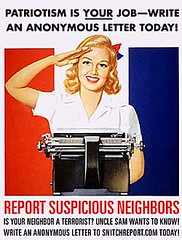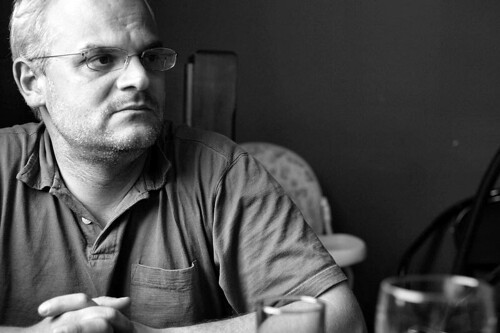Bear with me for moment here. I’m going to suggest something that might seem totally outrageous at first but just think about it for a minute.
Can it be merely a coincidence that London’s public transport system was attacked the very same week that the congestion charge for driving private cars through London rose from five to eight pounds a day? Is it too outrageous to suggest that the Mayor of London and (Al) Capita Ltd, the company collecting the congestion charge, conspired to bomb people off the trains and buses and into their cars?
Actually, yes. The answer is yes. There is absolutely no evidence of a causal link between the two events. And, even though I occasionally flirt with the concept of non-causal, synchronistic connections between events, synchronicity doesn’t apply here, because a) these two events don’t have synchronistic qualities and b) I want to appear rational and sane for the sake of the rest of this post
And my point?
The point is that, given the right state of mind, you can stitch virtually any events or observations together into a narrative, whether they are really meaningfully connected or not. Obvious enough, I just wanted to demonstrate that I’m aware of that before I suggest something that might seem totally outrageous at first. Please, bear with me.
It’s all George Orwell’s fault.
I first read 1984 when I was about fifteen. I hated it. It read like crap sci-fi, centring on a love story between two drab, lonely people. This says a lot about encouraging teenagers to read books written about themes that pass way over their heads. I pity any fifteen year old capable of comprehending 1984. If such a teenager exists they’ve got real problems.
Anyway, I reread the book for a second time some years later and got the point that time, sort of. But the curious thing is I haven’t really comprehended the book until quite recently. Very recently actually.
If you're a hardcore 1984 buff the next few lines aren't going to contain any surprises for you, sorry.
Contrary to popular belief 1984 isn’t sci-fi. It wasn’t a prediction. It was written in 1948 and the mirroring of the numbers wasn't coincidental. The bulk of 1984 wasn’t fiction either. Basing his book on the recent history of the Soviet Union and Nazi Germany, Orwell was writing about the threat of totalitarian regimes in the here and now. 1984 was written as warning but in a perverse way it also reads like a manual, quite a good one actually.
The popular conception of 1984 is that it is all about a future where everyone is under constant surveillance by Big Brother and, to most people, that’s what the book is all about.
But it’s about a lot more. 1984 is about controlling entire populations. And you cannot total control entire populations using surveillance alone. Even the most totalitarian regime imaginable doesn’t have the resources to watch everyone constantly. The surveillance is just there to identify the occasional dissenting individual in need of appropriate 'treatment'. The bulk of the population is controlled by keeping it in fear, keeping it poor, and manipulating peoples' very thought processes. Their thoughts are controlled through propaganda and through restriction of language, through the very words they use to think with.
Here are a few key 1984 concepts:
Doublethink - the power of holding two contradictory beliefs in one's mind simultaneously, and accepting both of them. Per Orwell…
‘To tell deliberate lies while genuinely believing in them, to forget any fact that has become inconvenient, and then, when it becomes necessary again, to draw it back from oblivion for just so long as it is needed, to deny the existence of objective reality and all the while to take account of the reality which one denies.
‘Through doublethink, the Party was able to not only bomb its own people and tell its citizens that the bombs were sent by the enemy, but all Party members - even the ones that launched the rockets themselves - were able to believe that the bombs were launched from outside.’
Newspeak - is closely based on English but has a greatly reduced and simplified vocabulary and grammar. This suited the ruling party, whose aim was to make subversive thought ("thoughtcrime") and speech impossible. The underlying theory of Newspeak is that if something can't be said, then it can't be thought.
Emmanuel Goldstein – the leader of ‘The Brotherhood’, dedicated to overthrowing the Party. Each member of The Brotherhood is said to have 3 or 4 contacts at one time which are replaced as people disappear, so that if a member is captured, he can only give up 3 or 4 others. Goldstein is always the subject of the "Two Minutes Hate," a daily, 2-minute period beginning at 11.00am at which some image of Goldstein is shown on the single channel telescreen.
1984 never makes clear whether Goldstein or the Brotherhood really exist or not, because it doesn’t really matter.
Perpetual War – The world of 1984 is engaged in a perpetual war that cannot be won, and its only purpose is to destroy the produce of human labour and life, and so keep the totalitarian society intact.
-
You can see where I’m going with this can’t you? And I'm certainly not the first person to start thinking along these lines but, please, indulge me and my next couple of posts…




















10 comments:
Mu teacher must have been a 1984 buff, I totally missed the confusing sci-fi plot. I'll go re-read this weekend.. 'ish.
@sparkling: 1984 is almost always described as 'Orwell's terrifying vision of the future'. Commentators, the media and academics, occasionally will use lines like 'this brings us one step nearer to an Orwellian style state' when talking about new surveillance techniques or similiar. The fact that the book was set in the future and inlcudes reference to a few pieces of new technology can also throw people off.
Whenever someone films productins of 1984 or similiar visions of society, they're almost invariably either set them in the future or in a 1940s style environment.
The point I'm working towards is that they should be set firmly in the present. Very much so
Anyway, I admit this post covers what is, to many, old ground. I'll try and work up something a little more original in the next couple of posts
I hate seeing 1984 misused by people (liberals especially, sorry I had to say it...) as fuel against the Bush (republican) administration. The people using Orwellian quotes to slam the current government, will also in the same breath propose Socialist ideologies (as sound ideas), THE EXACT KIND OF GOVERMENT ORWELL WAS WARNING US ABOUT!! People need to remember more than anything that Orwell was a strong opponent of English socialism and Russian Communism. He believed that the pure Socialism cannot exist and will always be corrupted and made Communist. SO PLEASE do not propose Socialist ideas, and quote Orwell as some kind of god. It is doublethink at its finest. Also please start reading these sort of books in the right historical context, Its not all about hating Bush. (Though I do hate him.)
I've still to put up a couple more posts to put this one in context.
but, yes, I'd broadly agree with what you're saying ...
- I'm not about to use Orwell to start any specific Bush bashing.
- I'm the last person on Earth you'd describe as a liberal or socialist so I'm not going there either
- and Orwell certainly wasn't a god
He did however produce a pretty good distillation of how totalitarian regimes work - Communist, Socialist, Fascist or otherwise. They're essentially indistinguishable.
Historical context? Sure. Orwell was writing in a grim post war Britain, he was a disillusioned Socialist and former correspondent for the, very real, Ministry of Information. I know all that. But good observations are timeless and not restricted to their historical context. And Orwell was a pretty good observer
I prefer 'Down and out in Paris and London'
andy
A good book, and it touches on life in parts of London we've both walked around and photographed
Do you know the story that the book was originally called 'Down and out in Paris?' but Orwell's publisher reckoned it was too short so Orwell had to go off and do more down and outing? He must have loved that
I apologize if it seemed as though I was bashing you... That was not my intention, I have just encountered a lot of Orwell misuse, especially in the face of the current US presidency.
I look forward to your future postings on the subject.
@coop: not bashing at all - you've raised some reasonable points and valid concerns
the tricky thing about writing about 1984 is that to those who know the book well some of the parallels with 2005 are obvious and cliched but to those who don't know the book well some of the parallels might come as news
as to whether my follow up posts hit the mark or not, we'll see. I write to arrange my thoughts - sometimes the result is coherent sometimes not
regards
S.
"I pity any fifteen year old capable of comprehending 1984. If such a teenager exists they’ve got real problems."
I take offence at that statement! Why comprehending 1984 in my teenage years has taught me valuable life skills. 1)Do not buy national lottery tickets, too close to the 'numbers' game for confort. 2) Avoid manufactured pop music. 3) Always keep a packet of razor blades in reserve.
lol
I love Orwell's vision of a proletariat treated by the Party as animals, living in squalor and poverty, kept sedate with vast quantities of beer, widespread pornography, and a national lottery
... boy did he get it wrong - that'll never happen
Post a Comment